Iran Imported Over 18 Million Mobile Phones In A Year
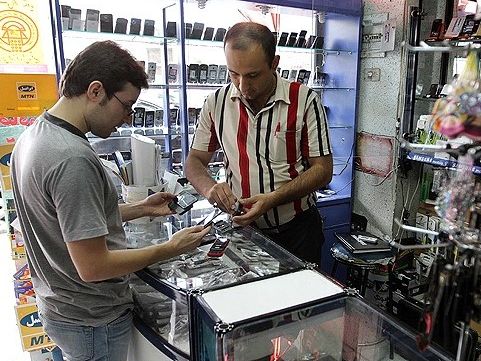
Iran with a population of 84 million has imported over 18 million mobile phones in the last 12 months, with Samsung and Xiaomi having the largest market share.

Iran with a population of 84 million has imported over 18 million mobile phones in the last 12 months, with Samsung and Xiaomi having the largest market share.
The spokesman for the association of mobile phone importers, Mohammadreza Aalian, told IRNA that Samsung had a 48-percent market share with 8,710,000 phones of different models worth nearly $1.88 billion.
Chinese brand Xiaomi had 28 percent of the market with 5,210,000 million cellphones, which totaled about $1.1 billion.
The third brand was Nokia with 12 percent or 2,250,000 that was worth only $54 million because most were simple devices, not smartphones.
Apple had a 6-percent share with 1,030,000 phones worth $1.35 billion, making it the runner-up in terms of the total value.
According to an earlier report by Tasnim news agency, Iran spent $9 billion in foreign currency to import 45 million cellphones in 33 months, until the end of 2021, with a large portion going for “luxury” devices with a price tag of over $600.
According to Tasnim’s data, around one quarter of the money, or about $2.3 billion was spent on importing just two million luxury phones – mainly from the American brand Apple. This is less than five percent of the total number of phones bought by the people. Buying such cellphones is too extravagant for most Iranians with ordinary nine-to-five jobs who are paid about $100 to $200 per month.
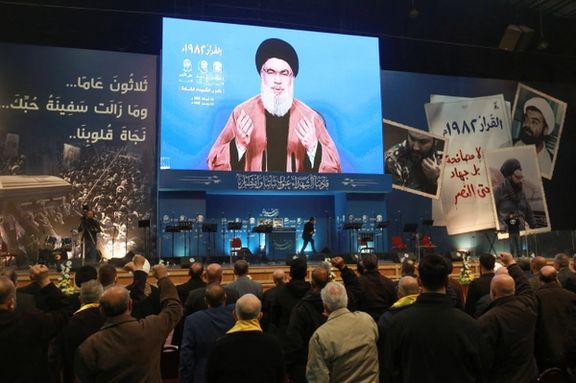
Hezbollah leader Hassan Nasrallah has denied reports that any of its forces are fighting alongside Russians in the invasion of Ukraine.
Nasrallah made the remarks on Friday after General Staff of the Armed Forces of Ukraine released a statement saying that around 1,000 fighters from the Iran-backed group and Syria were recruited to fight in Ukraine.
“I categorically deny anything of these claims. These claims are lies that are devoid of truth. No one from Hezbollah, no fighter or military expert, went to this arena or any of the arenas of these war,” Nasrallah said in a televised speech on Al Mayadeen TV.
Hezbollah is believed to have experts and advisors helping Iranian proxies and militias in Iraq and Houthis in Yemen. The Shiite group has also fought in the Syrian civil war for a decade alongside Bashar al Assad's forces.
On March 11, Russian President Vladimir Putin approved deploying up to 16,000 “volunteers” from the Middle East to fight alongside Russian forces.
"If you see that there are these people who want of their own accord, not for money, to come to help the people living in Donbass, then we need to give them what they want and help them get to the conflict zone," Putin said at a televised security council meeting from the Kremlin.
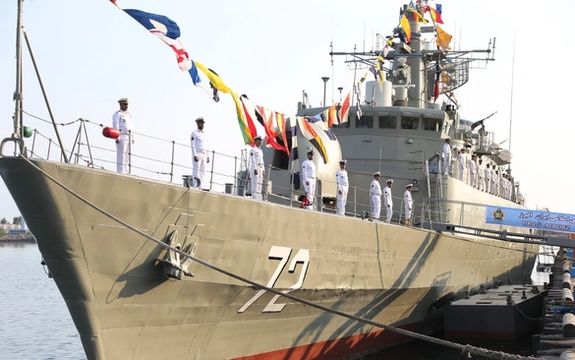
Iran’s Navy announced Saturday it has dispatched two naval vessel on a routine mission to high seas, including the Gulf of Aden.
The Army's 81st naval fleet left the country’s southern port city of Bandar Abbas on Friday after a see-off ceremony attended by the Navy’s commander Rear Admiral Shahram Irani.
Irani said during the ceremony that the mission is aimed at maintaining the Islamic Republic’s sway in international waters and providing security for merchant vessels and tankers in the region.
The fleet is comprised of a logistic ship and the Alborz warship, which is one of Iran’s three Alvand class – aka Saam class frigates that were originally built for the Imperial Iranian Navy. They were renamed after the Iranian Revolution and served in the Islamic Republic of Iran Navy during Iran-Iraq War. A fourth was sunk by the US Navy in 1988.
Iran barely has an ocean-going navy as it has not been able to acquire significant warships from naval powers and has attempted to build or convert commercial vessels to warships.
In May 2021, reports emerged that Iran dispatched two naval vessels to the Western hemisphere and an Iranian official confirmed the destination as Venezuela in June.
Then-commander of the navy, Hossein Khanzadi, said that the presence of its vessels in the Atlantic Ocean “is a response to US claims that Iran would never be able to have a presence in the Atlantic.”
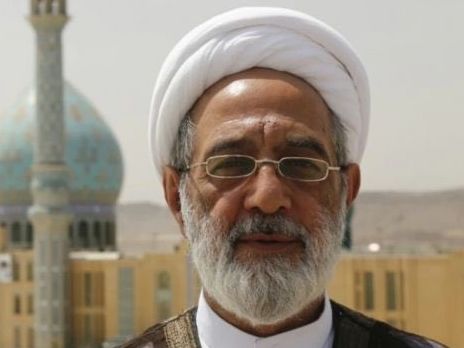
A former dean and lecturer in Islamic studies appointed head of a paramedical faculty in Iran has resigned after a barrage of social-media criticism.
Hossein Jalaei Nobari has stepped down from the Tabriz University of Medical Sciences, the university announced on Friday.
Cyberspace critics had argued there was a mismatch between Nobari’s experience as a dean-cum-theology teacher and the requirements of the post. Some argued it was wrong to appoint seminary graduates to manage in the health sector. In much of Europe and the United States, while many health managers have no background as doctors, there are specialist health managers that are rare in the Middle East and North Africa. But there have been reports in Iranian media about many doctors leaving the country because of economic and social restrictions.
The social-media reactions were followed by Health and Medical Education Minister Bahram Eynollahi writing to presidents of medical universities -- without mentioning Nobari – urging them to post "graduates of medical sciences" in managerial positions.
Earlier in March, the Tehran University of Medical Sciences appointed Mahmoud Eshtiaghi, a maddah or religious ‘reciter’ with no medical experience, as the head of the Bahrami Children's Hospital. Maddahs participate in anniversaries or funeral ceremonies and chant songs praising Islamic figures.
Since President Ebrahim Raisi took office last August there have been more controversial appointments based on family, social or political ties.
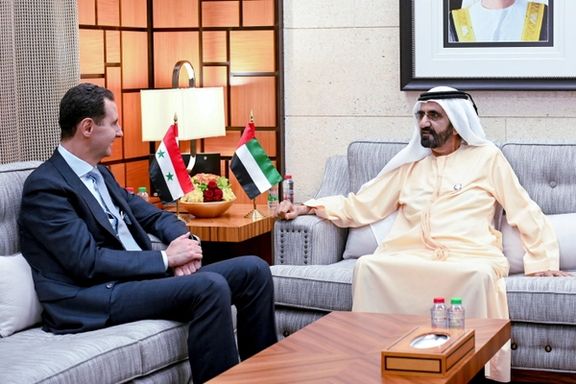
Washington has sharply rebuked Abu Dhabi for hosting Syrian President Bashar al-Assad on Friday, saying his visit was an apparent attempt to legitimize him.
The unexpected one-day visit was Assad’s first to any Arab country since Syria’s civil war started in 2011 when his opponents began protests against the authoritarian rule of the family.
The United Arab Emirates once backed rebels fighting Assad’s forces, but in recent months there have been signs of warming relations, showing that the Persian Gulf US ally is pursuing a very different policy from that of Washington.
The State Department said on Friday it was "profoundly disappointed and troubled" by what it called an apparent attempt to legitimize Assad.
The timing of the trip coincided with the eleventh anniversary of the Syrian uprising, at a time when Washington has been working worldwide to unite allies and partners against Russia's invasion of Ukraine. Assad is a close ally of Moscow, which intervened in Syria’s civil war in 2015 with air power in coordination with Iran that supplied ground troops to crush the rebels.
State Department spokesperson Ned Price reiterated that Washington remains opposed to efforts to normalize ties or rehabilitate Assad. He said the United States will not waive or lift sanctions on Syria unless progress is made toward a political solution to the conflict, which has killed hundreds of thousands of people since spiraling out of an uprising against Assad.
"We urge states considering engagement with the Assad regime to weigh carefully the horrific atrocities visited by the regime on the Syrians over the last decade, as well as the regime's continuing efforts to deny much of the country access to humanitarian aid and security," Price said in an email, Reuters reported.
Washington had expressed concern in November when the UAE foreign minister visited Damascus and met Assad.
But the Biden administration has eroded its political capital with both Riyadh and Abu Dhabi by not heeding their concerns about regional rival Iran, ending its support for their war in Yemen and slapping conditions on US weapons sales to the Gulf states.
Although Abu Dhabi has not commented much about US negotiations with Iran to restore the 2015 nuclear agreement known as JCPOA, but it has been very clear that both Saudi Arabia and the UAE regard the deal as inadequate to contain Iran’s missile and proxy threats in the region.
The UAE has also established closer ties with Israel since the landmark establishment of diplomatic relation in 2020. It is believed that the two countries share intelligence and cooperate against what they see as Iranian threats.
The UAE has also stayed neutral in the Ukraine crisis, saying a peaceful resolution is more important than taking sides, reflecting its close ties with Moscow. While it voted for a United Nations General Assembly resolution against Russia’s invasion, it abstained in a similar vote at the Security Council, which carried more weight.
In addition for a desire to protect its security amid misgivings about the Biden administration, the UAE also cares about its cooperation with Russia in the OPEC+ arrangement, where oil supplies have been controlled by major producers to avoid a sharp fall that occurred in 2014.
UAE Foreign Minister Sheikh Abdullah bin Zayed Al Nahyan who visited Moscow on Thursday said his government is keen to cooperate with Moscow on improving energy security.
To show their displeasure with Washington both Riyadh and Abu Dhabi have resisted boosting supplies after the Russian invasion, but they have to walk a line between the West and Russia.
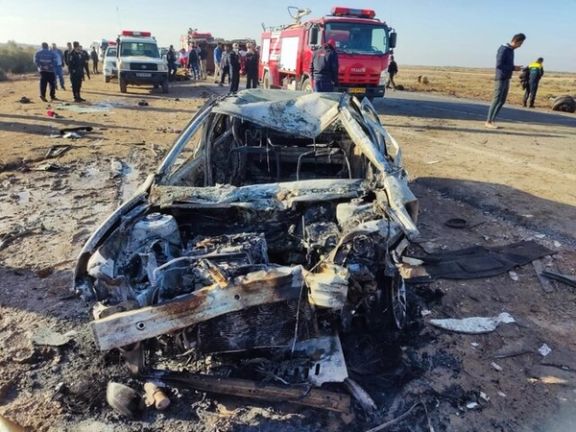
With the Iranian New Year, or Nowruz, holidays not yet started, at least 107 people have died in road accidents as traffic increases.
Announcing the figures on Saturday, the deputy head of Iran’s traffic police Teymour Hosseini said more people were taking intercity trips for Nowruz, which begins Sunday. Most of the accidents had occurred in Fars, Bushehr, Sistan-Baluchestan, and Yazd provinces, but Hosseini said traffic had increased everywhere, especially on roads to northern provinces near the Caspian.
As in many countries, restrictions on movement in place for the Covid-19 pandemic have been eased despite the continuing struggle with the Omicron variant: 782 have died in Iran in the past week, around the same as the United Kingdom but down from Iran’s peak of 4,444 in August.
Iran has a poor road safety record with annual fatalities around 20,000, although it is not in the top 50 globally according to World Health Organization reports for traffic fatalities per head of population. The fatality rate is lower than Saudi Arabia. Lebanon, Kyrgyzstan and Yemen, but higher than Iraq, Armenia, and the United Arab Emirates.
The toll is variously blamed on speed, poor quality of roads, lax inspection of vehicles, disregard for traffic laws, and inadequate emergency services. A 2017 report by Iran’s traffic police said that nearly 280,000 had been killed and more than 4 million injured in road accidents since 1998.